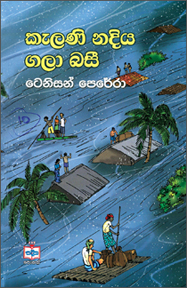And quiet flows the Kelani
 Kalani
Nadiya Gala Basi is the new novel released by Tennyson Perera to mark
the 50th year of his literary career. Having begun his writing career
with short story collections like ‘Uttari Sanda Eliya’ and ‘Dethi Roden
Upan Budun’, in his latest novel he focuses on the lives of the dwellers
of the left bank of the lower Kelani basin. Kalani
Nadiya Gala Basi is the new novel released by Tennyson Perera to mark
the 50th year of his literary career. Having begun his writing career
with short story collections like ‘Uttari Sanda Eliya’ and ‘Dethi Roden
Upan Budun’, in his latest novel he focuses on the lives of the dwellers
of the left bank of the lower Kelani basin.
The novel brings to life the slow pace of the people who lived by the
Kelani river during the first half of the 20th century. Tennyson shows
with empathy how their lives flow like the Kelani, smooth and sleepy
most of the time, but with predictable and unpredictable floods
devastating their homes and their farmland every now and then.
Those of us who are familiar with the plight of the flood victims
from ‘Kelani Palama’, would find this novel a contrast as it takes us
way back in to the past, when the flood victims were looked after by a
few families who had the wealth and the capacity to care for them during
the time of the floods.
This was a time when people did not wait for the government to come
to their assistance, a time when there was humanity still among the
humans, a time when the exploiters looked after the exploited.
These people never cursed the river for the devastation caused by
her, they never blamed her, but accepted the Kelani river as a part of
their life. The youth even looked forward to the floods so they could
bring out their boats and rafts and play around on the flood waters. The
adults did not deny them this joy and all this is described so well in
this novel.
The protagonist Corenelis Appuhamy, stood over the rest of the feudal
village, with his benevolence, his adultery and his dominance at home.
His wife, Jane Nona, really ran the household. She seemed to accept or
tactfully ignore her husbands attachments to other women in the village,
and tried to bring her children up to be better men.
Religious conversion is mentioned, as just another social occurrence,
as it had not yet become a political issue. ‘Vastu Christu’ was the name
given by the villagers to a man who had changed his faith to marry a
Christian woman.
The last scene reminds us of the typical way our village folk faced
their pain and sorrow, the man of the house drowning his sorrow with the
bottle of arrack and the woman wetting her pillow with a flood of tears.
One closes the book wishing Tennyson Perera had developed a real epic
around the Kelani basin, touching on the life on the right bank of the
river too, where life would have been different, in some ways, due to
the influence of the historic Kelani temple. The picture he would have
presented with the knowledge and empathy he has of the dwellers by the
river Kelani would then have been complete.
- Daya Dissanayake
|



